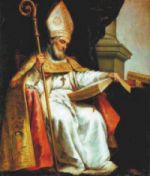The Eucharist and the Empty Tomb
By Dr. Jeff Mirus ( bio - articles - email ) | Nov 03, 2010
Catholic apologists are indebted to Glenn B. Siniscalchi, a Ph.D. candidate in systematic theology at Duquesne University, for reminding us all of the importance of the early celebration of the Eucharist as a proof that Jesus Christ rose from the dead. In general, arguments about the Resurrection—including my own—have focused largely on the empty tomb.
But there are two other significant arguments. One is the extraordinarily rapid growth of Christianity, despite few natural advantages, and despite considerable persecution. The only imaginable proportionate reason for this explosion is the Resurrection. And now, writing in the last (not only the most recent, but actually the final) issue of Christendom College’s journal Faith & Reason (Vol. 33), Siniscalchi reminds us of a third argument centering on the Eucharistic liturgy.
The earliest references to this liturgy are by St. Paul, who makes it clear that it is something he learned immediately following his conversion in the early 30’s AD. The chief apologetical points of the Christian Eucharist are its antiquity, the rapid rise of a common Eucharistic practice everywhere Christianity spread, the transformation of various ceremonial meals in Judaism to the Christian understanding of the Eucharist, the insistence on celebrating the Eucharist on Sundays, and the symbolic liturgical actions by which Christians expressed their belief in the Risen Christ.
Students of comparative religion have often portrayed Christian worship as something diffuse and developmental, different in various places and regions, and changing with changes in culture (true enough around the edges, so to speak, of liturgical development). And Modernists, for their part, have often asserted that faith in the Resurrection was a later development of the Christian community, a symbolic expression of a faith and hope that developed only over a considerable period of time.
But the actual history of the Eucharistic center of Christian worship reveals it as something both immediate and universal, very early and a defining characteristic of all Christians, no matter where or when their communities took root. What this tells us is that the Eucharist was directly connected to a particular event which was actually definitive for Christian faith.
That event, perhaps self-evidently, was the Resurrection of Jesus Christ, who henceforth would be worshipped with the Father as God. In other words, the character and immediacy of the Christian Eucharist is a compelling argument about why the tomb was empty on the first Easter.
All comments are moderated. To lighten our editing burden, only current donors are allowed to Sound Off. If you are a current donor, log in to see the comment form; otherwise please support our work, and Sound Off!
-
Posted by: -
Nov. 05, 2010 5:17 PM ET USA
Although there is certainly a direct connection between the Eucharist and the Resurrection, being the Resurrection the central part of Salvation, I'm not so sure that the main relation to the actual performance of the Euxharist ceremony by the early Church was to conmemorate the Resurrection. I think the obvious may be overlooked, that the single most important belief of that Church was that HE was present in the Eucharist, that is, the belief in his real Presence because HE is the Lord God.
-
Posted by: -
Nov. 04, 2010 3:20 PM ET USA
Took me 3 reads to come up with what I think you're writing, namely, that the Eucharistic liturgy was a way of saying that Christ was not THERE, in the tomb, but HERE, on the altar in the Eucharist. Please clarify if I got it wrong.
-
Posted by: koinonia -
Nov. 04, 2010 11:00 AM ET USA
And each of the Apostles with the exception of St. John suffered martyrdom for the Gospel they preached. The Apostles Creed includes the Resurrection. Theirs was a personal testimony to the veracity of the miracle of the Resurrection. Their example reinforced the faith of their disciples, and we can only imagine their personal devotion as they offered the Eucharistic liturgy in the early Church.








